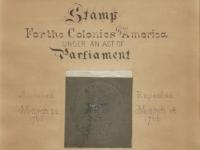The Taxation Acts were passed by the British government during the 1760s and 1770s to help pay off the debt the British had incurred during the French and Indian War. These taxes on trade and commerce caused unrest that would lead to the American Revolution. "Taxation without representation" was one of the central issues colonists had with the British because all laws and taxes were imposed by the British government without any colonist involvement. Many of the colonists believed that, because they were British citizens, they should be represented in Parliament if Parliament was going to make any laws that affected the colonists.
In this lesson students will learn about the Taxation Acts and relate them to our own state-imposed acts today. Students will explore “The Protest of the Committee of the Privates of the Military Association" and how the American Revolutionary soldiers desire for representation mirrors the reasoning why they went to war in the first place - lack of representation. Students will also analyze a Loyalist poem explaining the fear of leaving British rule and trust in the British constitution versus their feelings for the new U.S. Constitution.

